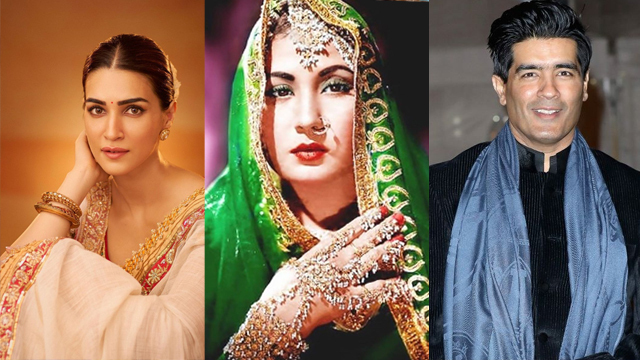In a shocking turn of events, actress-turned-producer Kriti Sanon and renowned fashion designer Manish Malhotra find themselves at the centre of a storm over their upcoming biopic on the legendary actress Meena Kumari. Meena Kumari, known for her mesmerizing performances and tragic life, continues to be an enigmatic figure even after her passing. However, her family, specifically Tajdar Amrohi, son of the late filmmaker Kamal Amrohi, is now threatening legal action against the project. This exclusive report delves into the ongoing controversy and the implications it holds for the industry.
A Legacy Under Threat
Tajdar Amrohi, the rightful heir of his parents’ legacies, expresses his deep concerns over the unauthorized biopic on his mother, Meena Kumari. In an interview, he fiercely defends his family’s right to control her narrative, stating that nobody should be allowed to make a film without his consent. Tajdar’s anger stems from a place of protectiveness and reverence for his parents, whom he believes deserve the utmost respect. To him, the proposed biopic is not just an intrusion into their personal lives but also a distortion of the truth.
A Love Story Unlike Any Other
Tajdar shares some lesser-known details about his parents’ relationship, shedding light on the genuine love that blossomed between them. Contrary to popular belief, it was not Kamal Amrohi who whisked Meena Kumari away from her home, but rather Meena Kumari who willingly entered Kamal Amrohi’s life. Tajdar paints a picture of two individuals deeply in love, who nurtured their relationship over phone conversations, rather than clandestine meetings in the shadows of studios. The magnetic voice of Kamal Amrohi captivated Meena Kumari, leading to a love story that influenced her career significantly.
The Ethical Dilemma
The controversy surrounding the Meena Kumari biopic raises pertinent questions about the ethical responsibilities of filmmakers and the consent of the families involved. Tajdar’s outrage is justified, as he believes that only he holds the key to the truth behind his parents’ lives and their unparalleled connection. By embarking on this project without consulting him, Kriti Sanon and Manish Malhotra have unknowingly created a rift between the family and the film fraternity.
Legal Battle on the Horizon
Fueled by a desire to protect his parents’ legacy, Tajdar Amrohi is determined to take legal action against Kriti Sanon and Manish Malhotra. With the support of his sister, Rushksar, Tajdar plans to seek justice through the legal system. While the specifics of the legal action are yet to be determined, Tajdar’s resolve sends a strong message to the industry, highlighting the need for transparency and respect when handling the lives of public figures.
The Industry’s Ethical Responsibility
The Meena Kumari biopic controversy raises broader concerns about the industry’s ethical responsibility when portraying the lives of iconic figures. While biopics offer a glimpse into the lives of renowned personalities, it is crucial to approach such projects with sensitivity, respect, and the consent of the individuals or their families. By disregarding Tajdar Amrohi’s objections and proceeding with the film, Kriti Sanon and Manish Malhotra have inadvertently ignited a debate about the industry’s accountability.
Preserving the Authenticity of Meena Kumari’s Legacy
Tajdar Amrohi’s vehement opposition to the biopic stems from his desire to protect the authenticity of his parents’ story. He believes that only he holds the true understanding of their relationship and the impact it had on Meena Kumari’s career. Tajdar fears that an unauthorized biopic might distort the facts, perpetuating myths and misconceptions about his family’s history. By taking legal action, he hopes to ensure that his parents’ legacy remains intact and untainted by external influences.
The Role of Filmmakers and Collaborators
The controversy also raises questions about the responsibilities of filmmakers and collaborators in biopics. Filmmakers need to approach such projects with thorough research, empathy, and a commitment to representing the subject’s life and legacy accurately. Collaboration with family members or close associates can provide invaluable insights and help maintain the integrity of the narrative. This incident serves as a reminder that the involvement and consent of the subject’s family should be sought and respected throughout the creative process.
A Turning Point for Biopics
The Meena Kumari biopic controversy may mark a turning point in the way biopics are approached and produced in the Indian film industry. It serves as a wake-up call for filmmakers, urging them to reconsider their methods and ethical obligations when portraying the lives of real people. The incident may lead to the establishment of guidelines and protocols that prioritize transparency, collaboration, and consent, ensuring that future biopics are respectful and authentic representations of their subjects.
The Clash of Artistic Freedom and Personal Narratives
The Meena Kumari biopic controversy brings to the forefront the clash between artistic freedom and personal narratives. While filmmakers argue that biopics provide a platform for creative expression and exploration of historical figures, families and loved ones of the subject often feel a sense of protectiveness and responsibility towards preserving their memory. This conflict raises a broader question: where does artistic freedom end, and personal boundaries begin?
In the case of Tajdar Amrohi, he believes that the proposed biopic on his mother’s life is an intrusion into his family’s private sphere. He argues that outsiders cannot fully grasp the complexities of his parent’s relationship and that their story should not be subject to artistic interpretation without his consent. This clash highlights the need for a delicate balance between honouring artistic endeavours and respecting the personal narratives of those involved.
The Power Dynamics in the Film Industry
The Meena Kumari biopic controversy sheds light on the power dynamics within the film industry. Tajdar Amrohi’s frustration stems from a feeling of industry insiders encroaching upon his family’s legacy without seeking his input. This situation raises questions about who holds the power and authority to tell someone’s story and whether there should be a more inclusive and collaborative approach.
The incident also highlights the need for greater representation and diverse perspectives within the filmmaking process. When marginalized voices are excluded from decision-making, it can lead to the misrepresentation of their stories and experiences. The Meena Kumari biopic controversy serves as a reminder that the industry should strive for inclusivity and ensure that all stakeholders, especially those with a personal connection to the subject, are allowed to contribute and shape the narrative.
The Impact on Future Biopics
The Meena Kumari biopic controversy is likely to have a lasting impact on how future biopics are approached and received by audiences. Filmmakers may become more cautious about tackling sensitive subjects without proper research, consultation, and consent. They may recognize the importance of collaborating with family members or close associates to ensure authenticity and respect for the subject’s legacy.
Additionally, audiences may become more critical of biopics and demand greater transparency and accuracy in storytelling. The controversy has ignited discussions about the responsibility of filmmakers to present a balanced and truthful portrayal of real-life individuals. It may lead to a heightened awareness among viewers, encouraging them to question the veracity of biopics and seek out multiple perspectives to form a more comprehensive understanding of the subject.
The Role of Public Perception and Legacy
The Meena Kumari biopic controversy highlights the influence of public perception and the preservation of a legendary figure’s legacy. Tajdar Amrohi’s fierce opposition stems from his belief that an unauthorized biopic could potentially distort the public’s perception of his parent’s lives and their contributions to the film industry. He feels a deep responsibility to protect his mother’s memory and ensure that her legacy remains intact.
The incident raises questions about the fine line between public fascination and exploitation. While biopics offer an opportunity to celebrate and remember influential individuals, they also run the risk of sensationalizing and commodifying their lives for commercial gain. Tajdar’s legal action serves as a reminder that it is essential to approach biopics with reverence and sensitivity, recognizing the impact they can have on the public’s understanding of historical figures.
Ownership of Personal Stories and the Right to Privacy
The Meena Kumari biopic controversy also brings into focus the ownership of personal stories and the right to privacy. Tajdar Amrohi firmly asserts that he, as the son of Meena Kumari and Kamal Amrohi, has the ultimate authority to decide how his parents’ story should be portrayed. This raises broader questions about the boundaries between public figures and their families, and the extent to which their personal lives can be explored without their consent.
In an age where the lines between public and private have blurred, the controversy serves as a reminder of the need for ethical considerations. While public figures may lead extraordinary lives, their families often bear the brunt of public scrutiny and the consequences of unauthorized portrayals. The incident prompts us to reflect on the importance of respecting personal boundaries and the right to privacy, even in the pursuit of creative endeavours.
Collaborative Approaches and Empathy
The Meena Kumari biopic controversy calls for a more collaborative approach to storytelling and a greater emphasis on empathy. By actively involving family members and close associates, filmmakers can gain unique insights and ensure a more nuanced portrayal of the subject’s life. Empathy plays a crucial role in understanding the emotional impact of such projects on the individuals closest to the subject.
By prioritizing collaboration and empathy, filmmakers can build trust, foster authentic storytelling, and mitigate potential controversies. This incident serves as a reminder that the process of creating biopics should be driven not only by commercial interests but also by a genuine desire to honour and respect the lives and legacies of the individuals being portrayed
In conclusion, the Meena Kumari biopic controversy has ignited a fierce debate surrounding the intersection of artistic freedom, personal narratives, and ethical responsibilities within the film industry. Tajdar Amrohi’s determination to protect his parents’ legacy highlights the significance of obtaining consent and involving the families of the subjects in biopics. The clash between art and personal boundaries calls for a delicate balance, where the rights of the individuals intimately connected to the subject’s life are respected.
This controversy has shed light on power dynamics within the industry, emphasizing the need for inclusivity, diverse perspectives, and representation in the filmmaking process. It serves as a reminder that marginalized voices should be given an equal platform to contribute and shape the narrative surrounding their loved ones.
Moreover, the Meena Kumari biopic controversy is likely to have a lasting impact on future biopics. Filmmakers may become more cautious, conducting thorough research and seeking collaboration with family members or close associates to maintain authenticity and accuracy. Audiences, too, may demand greater transparency and scrutiny, questioning the veracity of biopics and seeking multiple perspectives to form a comprehensive understanding.
Ultimately, the controversy calls for a more empathetic and collaborative approach to storytelling. It reminds the industry of the importance of preserving the legacy of iconic figures while respecting the boundaries of their personal lives. As the legal battle unfolds, the Meena Kumari biopic controversy has the potential to reshape the way biopics are approached, highlighting the necessity of ethical considerations, consent, and responsible storytelling.
It is hoped that this incident will catalyze positive change, leading to a more conscientious era of biopics that honour the lives and legacies of individuals while preserving their truth and authenticity. By striking a balance between creative expression and personal narratives, the industry can ensure that the stories of iconic figures are portrayed with integrity and respect, leaving a lasting impact on both the audience and the subject’s families.








0 Comments